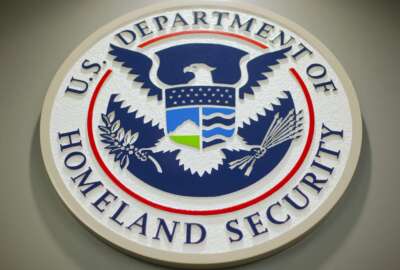A major federal transportation project has reached a milestone
One of the TSA's most successful innovations is PreCheck, which recently hit the milestone of 20 million enrollees.
The Transportation Security Administration is constantly tweaking the airport screening process. Something that speeds up screening even by a few seconds can have a profound effect on wait times and airport crowding. One of the TSA’s most successful innovations is PreCheck, which recently hit the milestone of 20 million enrollees. Joining the Federal Drive with Tom Temin with an update, TSA assistant administrator Neal Latta.
Interview transcript:
Tom Temin Mr. Latta, good to have you with us.
Neil Latta Thanks Tom, thanks for having me.
Tom Temin And 20 million is a good number. I mean, you know, except for IRS and Social Security, it’s hard to get 20 million Americans in anything, but it’s still not a gigantic percentage of the people that fly, or what do you know about it?
Neil Latta Yeah. So 20 million is a big accomplishment for us. So, those are the number of people that are enrolled, that have enrolled in the program. We actually have 40 million individuals that are eligible for TSA PreCheck, that could be individuals such as Department of Defense, Department of DHS, workers as well, that are part of that. And then Global Entry is another big portion of those as well. So, that’s 40 million individuals. Right now, we’re finding at our checkpoints up to 30, between 30 and 40% of travelers are actually TSA PreCheck. So we are having a larger portion come through those lines and still still maintaining the wait times that we we aspire to, which is under 10 minutes. So, 98% of our folks are under 10 minutes in their wait time.
Tom Temin And is PreCheck, in fact, faster than regular check?
Neil Latta Yes, absolutely, it’s faster than standard. And quite honest, we’ve been hitting major milestones this summer, in summer travel. Travel is back. We hit over 3 million people and on July 7, and which was a Sunday, and we’ve hit other milestones along with that, too, and been able to keep up with that volume, largely in part by innovation such as TSA PreCheck.
Tom Temin But there have also been quite a number of technological innovations that make screening, regardless of whether you’re PreCheck or regular check, that have come in in the last couple of years. Maybe review a couple of those for us.
Neil Latta Sure. Absolutely, we’re doing one right now that has a lot of promise. It’s called the touchless identity solution, and it’s for TSA PreCheck members that opt in, that uses a biometric to match your face against the photograph of your passport, and so no ID is presented at the checkpoint. Under five seconds for individuals to go through that process, not having to take anything out. The touchless aspect of it is very appealing and has received great reviews from the public.
Tom Temin And do you share that technology from Global Entry, which has a similar way of you know, having been through customs now a couple of times myself, in literally 20 seconds?
Neil Latta Yes, yeah. In fact, we leverage the same technology. We build on their backbone and use their technology. So, it’s a synergy between the two departments.
Tom Temin And with respect to getting back to PreCheck, it’s not simply a pure project of Transportation Security Administration. You’ve got corporate and commercial partners that kind of help amplify it.
Neil Latta Yes. Our enrollment provider, our network is over 700 enrollment locations right now, and growing. You can go to places such as Office Depot, Staples, any large airport and other retail locations to do this in enrollment, and we’re continuing to grow that space as well.
Tom Temin And when you have meetings, I mean, what are the metrics that the agency looks at when it comes to a project or a program like PreCheck that you watch to see where it’s headed?
Neil Latta Yeah. So a couple things we look for, I think we hit on a little bit early was the consistency through the checkpoint, how fast they can get through. We also look and do customer service is big for us as well, and we monitor and watch the amount of inquiries that we get. So, with 20 million people, we actually get about 1,000 inquiries a day from the public, sometimes about name changes and things like that, and we respond to those within 24 hours. So, very proud of that, too, that we can get back to the customer to date their records so they can go through seamlessly.
Tom Temin We’re speaking with Neil Latta. He’s the assistant administrator of the Transportation Security Administration. And would you say that improved labor relations? And, of course, you know, unions and agencies always have some degree of loggerheads, but I think it’s fair to say that with the establishment, finally, of agreements and improvements over the years on everything from the uniforms to the shift scheduling and so forth for the TSOs, has that had an effect on screening and screening efficiency, do you think?
Neil Latta Yeah, the big one that we had last year was the effort of pay equity, which brought our TSOs pay up to commensurate with others in the in that same space. And that has had a big effect for us and and thanks to Congress for for passing that and ensuring that it got passed again this year.
Tom Temin Yes, because, I guess it’s, not to put it crudely, but you don’t want an unhappy employee taking it out on the poor guy with flip flops and a bottle of shampoo.
Neil Latta That’s right, that’s right. Vice versa, too.
Tom Temin Well, that’s true too. Yes, you got to be nice to people you encounter in general. That’s what our grandmothers taught us. And with respect to shampoo, I know that TSA has a large program of research, and you’re accompanied by the science and technology directorate laboratory on transportation security to be able to understand what’s actually in a bottle beyond visually, to let more things through and speed up screening that way. Any progress milestones on that front?
Neil Latta Yeah, we continue to make milestones there. We have a lab, I think you’ve been to as well. And then we also have a test facility in Las Vegas that we’re doing different things there. You know, one is self screening that we tested out, I think that hit the news quite a bit. So, we’re testing that as a product that maybe have viability inside of the TSA PreCheck lanes. But we continue to do evolve with liquids and being able to screen against those liquids and determine if there’s any threat there.
Tom Temin So if someone, I guess the potential, the goal is, if someone brings a quart of something, you can tell what it is in that quart.
Neil Latta Yeah, I think the technology will get there. I don’t believe it’s there just yet. We continue to work with industry to enhance that technology.
Tom Temin And travel security is an international activity, and people encounter other systems in other nations. Is there much international cooperation and sharing of best practices between TSA and, say, your counterparts in the countries that we would want to cooperate with?
Neil Latta Yes, there’s a lot of cooperation across the board. The European Union is a big partner in that we do a lot of work with them on the technology and also on the standards, detection standards. We want to make sure that whatever we test against, they are testing the same thing, and then we also have the same commensurate screening across because they are traveling to the United States, and we’re traveling to their destination, so we’re mutual beneficial from that.
Tom Temin Well, what else do we need to know about what’s going on at TSA? Because I think again, I mentioned social security and IRS, probably no other agency touches as many people consistently as TSA.
Neil Latta Yeah, the one program I will highlight that TSA is in the in the process of implementing, is the Real ID program, and that will come into effect May of 2025, next year. And we’re continuing to push with our partners. Identity is critical for us at our checkpoints, and having a Real ID and having a foundation of a strong identity is critical for our screening.
Tom Temin And I heard once or discussed it with somebody once, the notion, the goal of screening, not at the checkpoint before the gate concourse, but screening when someone is driving to the airport. Sounds impossible, but maybe not so much.
Neil Latta Yeah, I think we continue to evolve. We continue to look at things like that, of which ways we can ensure that we don’t have to have people through our checkpoints and be able to make sure that that person still is secure when they get into the sterile area of the airport. Well, it may be far fetched right now, but maybe in the future, it may not be.
Tom Temin Because maybe closer to the reality is the idea of, for lack of a better word, touchless screening, where someone simply walks under an archway and can be screened without the stopping and looking again. Probably the technology is potentially there, but how far away would that be?
Neil Latta Yeah, we’re looking at technologies that have screening as you move to be able to do that so you don’t have to stop. I do think the touchless solution for biometrics has great application, and the fact that you don’t have to take anything out of your, touch anything, and you can move forward. So there’s a lot of exciting things going on right now,
Tom Temin Because we read a few years ago the idea of body motion and ways of telling intent or emotional state from physical characteristics that can be measured and monitored from a distance. Is that coming into the mix at all, or is that maybe considered a problem on the privacy front and the false positive front?
Neil Latta Yeah, you do run into some of the concerns there of profiling when it comes to that, that we have to watch out for. And so that does, that does come into a problem.
Tom Temin And it is summertime, and as a citizen of the United States, you go to the beach, you go to barbecues. What do people pester you about the most when they find out what you do?
Neil Latta Usually I get questions about, what if someone didn’t have a good experience at a checkpoint? I will get questions about that. Or if they didn’t get PreCheck on their boarding pass, I will get that quite a bit.
Tom Temin Yeah, just day to day stuff, and you probably tell them, I personally can’t help you with that one. Neil Latta is the assistant administrator of the Transportation Security Administration. Thanks so much for joining me.
Neil Latta Thank you, Tom. Thanks for having me.
Tom Temin We’ll post this interview at federalnewsnetwork.com/federaldrive. Hear the Federal Drive on demand. Subscribe wherever you get your podcasts.
Copyright © 2025 Federal News Network. All rights reserved. This website is not intended for users located within the European Economic Area.
Tom Temin is host of the Federal Drive and has been providing insight on federal technology and management issues for more than 30 years.
Follow @tteminWFED






